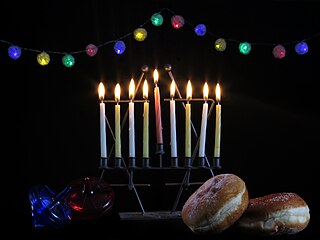
All Souls' Day, also known as the Commemoration of All the Faithful Departed and the Day of the Dead, is a day of prayer and remembrance for the faithful departed, which is observed by Roman Catholics and other Christian denominations annually on 2 November. All Souls' Day is often celebrated in Western Christianity; Saturday of Souls is a related tradition more frequently observed in Eastern Christianity. Adherents of All Souls' Day traditions often remember deceased friends and relatives in various ways on the day. Through prayer, intercessions, alms and visits to cemeteries, people commemorate the poor souls in purgatory and gain them indulgences. Beliefs and practices associated with All Souls' Day vary widely among Christian denominations.

Hanukkah, also known as the Festival of Lights, is a Jewish festival commemorating the recovery of Jerusalem and subsequent rededication of the Second Temple at the beginning of the Maccabean revolt against the Seleucid Empire in the 2nd century BCE.

Inayat Khan Rehmat Khan was a professor of musicology, singer, exponent of the saraswati vina, poet, philosopher, and pioneer of the transmission of Sufism in the West. At the urging of his students, and on the basis of his ancestral Sufi tradition and four-fold training and authorization at the hands of Sayyid Abu Hashim Madani of Hyderabad, he established an order of Sufism in London in 1914. By the time of his death in 1927, centers had been established throughout Europe and North America, and multiple volumes of his teachings had seen publication.

Vilayat Inayat Khan was a teacher of meditation and of the traditions of the East Indian Chishti Sufi sect of Sufism. His teaching derived from the tradition of his father, Inayat Khan, founder of The Sufi Order in the West, in a form tailored to the needs of Western seekers. One of his sisters was Noor Inayat Khan GC MBE. He taught in the tradition of universal Sufism, which views all religions as rays of light from the same sun. His parents met at the New York City ashram of American yogi, Pierre Bernard, half-brother of his mother Pirani Ameena Begum.

Advent is a season of the liturgical year observed in most Christian denominations as a time of expectant waiting and preparation for both the celebration of the Nativity of Christ at Christmas and the return of Christ at the Second Coming. Advent is the beginning of the liturgical year in Western Christianity, and is part of the wider Christmas and holiday season.

Vespers is a service of evening prayer, one of the canonical hours in Eastern Orthodox, Coptic orthodox, Roman Catholic and Eastern Catholic, Lutheran, and Anglican liturgies. The word for this fixed prayer time comes from the Greek ἑσπέρα and the Latin vesper, meaning "evening".

The Chishtī Order is a tariqa, an order or school within the mystic Sufi tradition of Sunni Islam. The Chishti Order is known for its emphasis on love, tolerance, and openness. It began in Chisht, a small town near Herat, Afghanistan, about 930 AD.

Samuel L. Lewis also known as Murshid Samuel Lewis and Sufi Ahmed Murad Chisti was an American mystic and horticultural scientist who founded what became the Sufi Ruhaniat International, a branch of the Chishtia Sufi lineage. After a lifetime of spiritual study with teachers East and West, primarily Inayat Khan and Nyogen Senzaki, Lewis was recognized simultaneously as a Zen master and Sufi murshid by Eastern representatives of the two traditions. He also co-founded the Christian mystical order called the Holy Order of Mans. His early interest in international seed exchange and organic agriculture also established him as one of the pioneers of green spirituality. His most enduring legacy may be the creation of the Dances of Universal Peace, an early interspiritual practice that has spread around the world in the 50 years since his passing.

A votive candle or prayer candle is a small candle, typically white or beeswax yellow, intended to be burnt as a votive offering in an act of Christian prayer, especially within the Anglican, Lutheran, and Roman Catholic Christian denominations, among others. In Christianity, votive candles are commonplace in many churches, as well as home altars, and symbolize the "prayers the worshipper is offering for him or herself, or for other people." The size of a votive candle is often two inches tall by one and a half inches diameter, although other votive candles can be significantly taller and wider. In other religions, such as Hinduism and Buddhism, similar offerings exist, which include diyas and butter lamps.

Tenebrae is a religious service of Western Christianity held during the three days preceding Easter Day, and characterized by gradual extinguishing of candles, and by a "strepitus" or "loud noise" taking place in total darkness near the end of the service.
Easter Vigil, also called the Paschal Vigil or the Great Vigil of Easter, is a liturgy held in traditional Christian churches as the first official celebration of the Resurrection of Jesus. Historically, it is during this liturgy that people are baptized and that adult catechumens are received into full communion with the Church. It is held in the hours of darkness between sunset on Holy Saturday and sunrise on Easter Day – most commonly in the evening of Holy Saturday or midnight – and is the first celebration of Easter, days traditionally being considered to begin at sunset.

Sufi philosophy includes the schools of thought unique to Sufism, a mystical branch within Islam, also termed as Tasawwuf or Faqr according to its adherents. Sufism and its philosophical traditions may be associated with both Sunni Islam and Shia Islam. It has been suggested that Sufi thought emerged from the Middle East in the eighth century, but adherents are now found around the world. According to Sufism, it is a part of the Islamic teaching that deals with the purification of inner self and is the way which removes all the veils between divine and man. It was around 1000 CE that early Sufi literature, in the form of manuals, treatises, discourses and poetry, became the source of Sufi thinking and meditations. Sufi philosophy, like all other major philosophical traditions, has several sub-branches including metaphysics and cosmology as well as several unique concepts.

Nūr may refer to the "Light of God". The word "nūr" is Arabic for "heatless light", and has been passed on to many other languages. It is often used in the Quran, notably in a verse that states has been the subject of much discussion. Many classical commentators on the Quran considered that this should be taken metaphorically, as in the sense that God illuminates the world with understanding, rather than literally. The first and foremost to representatively stand to the concept of Nur Muhammad being the quintessence of everything was Sayyid Abdul Qadir Gilani, who described this idea in his book Sirr ul Asrar. This concept was then preached by his disciples. One of Sayyid Abdul Qadir Gilani's disciples was the Andalusian scholar Abu Bakr ibn al-Arabi, who categorized nūr into different levels of understanding from the most profound to the most mundane. Shias believe nūr, in the sense of inner esoteric understanding, is inherited through the Imams, who in turn communicate it to the people.

The ceremonial use of lights occurs in liturgies of various Christian Churches, as well as in Jewish, Zoroastrian and Hindu rites and customs.

Altar candles are candles set on or near altars for religious ceremonies. Various denominations have regulations or traditions regarding the number and type of candles used, and when they are lit or extinguished during the services.

The Inayati Order (Inayatiyya), is an international organization dedicated to spreading the Sufi teachings of Inayat Khan, a musician and mystic who first introduced Sufism to the modern Western world in 1910. The Inayati Order operates internationally through a network of centers, and offers a number of programs and activities. It is led by Zia Inayat Khan, grandson of Inayat Khan.
Universal Sufi Prayers are also known as the Confraternity Prayers.
The Sufi Ruhaniat International (SRI) is a stream of Universal Sufism and draws inspiration from traditions of Sufism within and beyond historic Islam. SRI is an initiatic order within the lineage of Inayat Khan (Inayati-Chishtiyya). Sufi Ahmed Murad Chisti, a disciple of Inayat Khan, formally founded the order in 1970. There are centers throughout the United States, Belgium, Canada, the Netherlands and the United Kingdom.

Jameela Siddiqi is a London-based British novelist, journalist. She is a broadcaster, linguist and specialist in Indian classical music and poetry. Siddiqi is the author of post-colonial fiction dealing with themes of expulsion, migration identity and exile. She is also known for her work in the devotional music of Hindus, Muslims and Sikhs.
Western Sufism, sometimes identified with Universal Sufism, Neo-Sufism, and Global Sufism, consists of a spectrum of Western European and North American manifestations and adaptations of Sufism, the mystical dimension of Islam, established in the twentieth century.
















